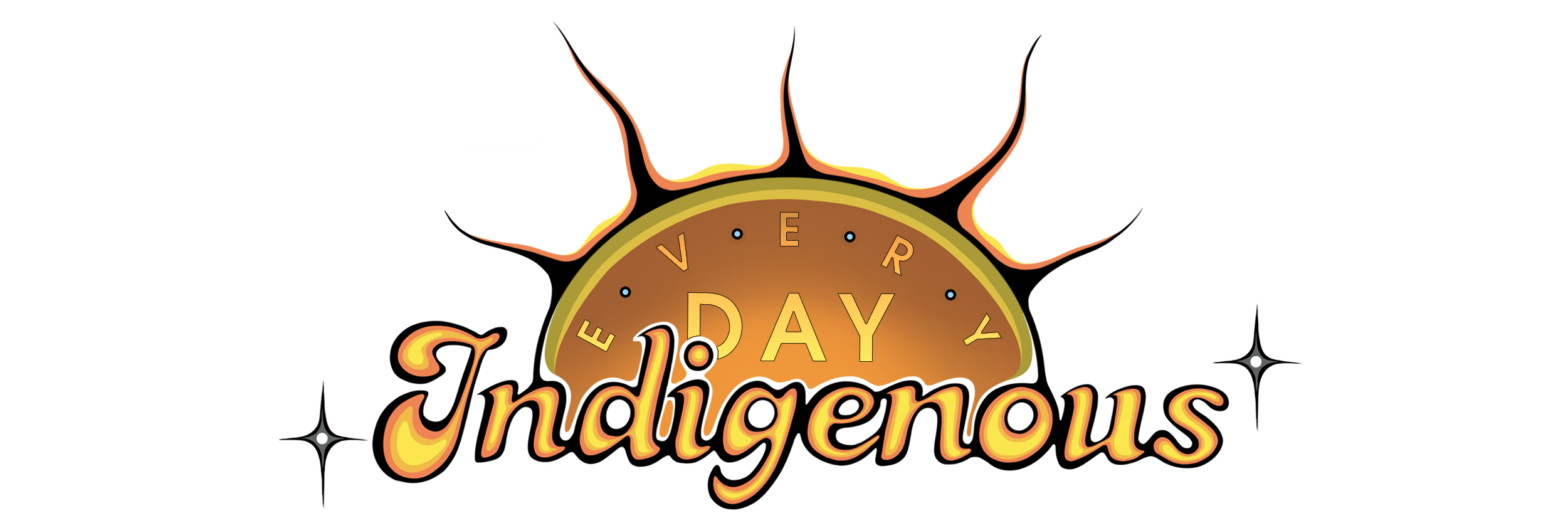LOLing Is Good Medicine: How Indigenous People Use Humour For Survival
Introducing Every Day Indigenous, our series centering and celebrating Indigenous people. Through strength and resistance, comes joy.
It’s time to share that.
Growing up, my mom always told me, “if you don’t laugh, you’re gonna cry.” I haven't heard an expression that encapsulates Indigenous humour so perfectly since.
I was raised in Kahnawà:ke Mohawk Territory, and like many other Indigenous communities, we have faced our hardships. I grew up with the legacy of the 1990s Oka Crisis, which my community was directly a part of. Our borders have been slowly stripped away and our families displaced until we were left with only a small fraction of territory. Our women have gone missing and have been murdered. Our children attended residential school, and not all survived.
AdvertisementADVERTISEMENT
In spite of all that we’ve endured, when I picture my community, all I can think about are my aunties laughing; throwing their heads back, slapping each other’s arms, and cackling like hyenas.
Indigenous humour is dark. Some call it gallows humour, but whatever it is, it has been our key coping mechanism, helping us survive 500 years of colonization. Indigenous people are masters at taking the hurt and pain that was dealt to us, laughing in the face of it, and weaving it into ridiculous comedy gold.
I’ve heard my mother share heart-wrenching stories of her childhood and horrific events she’s faced — and in the same breath, she’ll have us bent-over laughing, struggling to catch our breath and trying not to pee our pants. But this isn’t only because my mom is a funny woman; she’s inherited her humour from a long line of wise-cracking Mohawks. Only in Indigenous communities will funerals be some of the wildest, comical overnight celebrations. We often alternate between laughing and crying while recounting stories of the stupid things our relative did when they were young.
It always surprises me when non-Native people don’t know how silly we are. But I guess it makes sense; for the past hundred years in media, we’ve been consistently portrayed as stoic, chief-y Indians, with mystic connections to land and spirit. Growing up, I honestly didn’t even realize that in old westerns and in movies like Disney’s Pocahontas, the Indians they were portraying were meant to be us.
AdvertisementADVERTISEMENT
It’s only been recently that Indigenous people have been given long overdue space behind and in front of the camera, and audiences are finally getting a glimpse of Native comedy. Two new shows, Rutherford Falls and Reservation Dogs (both led by trailblazing Indigenous showrunners) perfectly capture the fine line that weaves between laughing, mourning, and healing that Indigenous people do so well. Rutherford Falls is a heartfelt sitcom that explores the need to preserve cultural history, and Reservation Dogs is a slice-of-life series that follows four Native kids in Oklahoma who commit crimes and solve them. I’ve been lucky enough to be a part of both.
“
Indigenous people are masters at taking the hurt and pain that was dealt to us, laughing in the face of it, and weaving it into ridiculous comedy gold.
”
The small screen isn’t the only place that Indigenous folks are sharing our joy and our jokes — it’s also online. This pandemic has been incredibly difficult. Something that's made it harder for Indigenous communities is that we're so community driven. Pre-pandemic, you couldn’t celebrate a birthday, run to the post office, or even live at home without being surrounded by aunties, siblings, cousins, and tótas. Heck, my community used to live in longhouses where over 50 people would sleep under one roof. For me, as a Kanien’kehá:ka woman, being around my community is fuel, and my sisters’ laughter is my medicine. Over the past year we’ve had to rely on more and more social media to find connection — which isn’t always a fulfilling replacement.
But like we do best, our community has turned our struggles into comedy, this time, over the internet. Over the past year, Native Twitter, Indigenous TikTok, and NDN meme accounts have exploded, becoming the most recent iteration of Indigenous resilience.
AdvertisementADVERTISEMENT
In the U.S., CNN deliberately left Indigenous people out of their election polls, sliding us into the category of “something else,” — and you better believe Indigenous people reclaimed that and turned it into a meme. Another promise of reconciliation broken? There’s a meme for that. The online Native community has hilariously criticized our damaging crab-in-bucket mentality of “if I can’t have it, neither can you” with a perfectly summarized joke. And over the past year, Indigenous Instagram basically appointed Baby Yoda as an NDN baby, adorned with a Pendleton blanket and cedar tea.
Whether it be poking fun at ourselves and how we operate, or calling out Canada’s hypocrisy — laughing is how we connect with each other, how we find community, but ultimately it’s how we heal. When there’s nowhere to go, when we’re in our (what feels like thousandth) lockdown and everything feels increasingly heavy, laughing at the situation is our touchstone. And, like everything Indigenous people have endured, we are getting through this, too, one auntie-cackle at a time.
Devery Jacobs is an award-winning actor born and raised in Kahnawà:ke Mohawk Territory.
The Refinery29 Canada team acknowledges that we are settlers on the land now known as Canada. We stand in solidarity and support of Indigenous people and we recognize that all of us have an ongoing part to play in reconciliation. We thank the Indigenous community for allowing us to live and work on their land.
AdvertisementADVERTISEMENT







